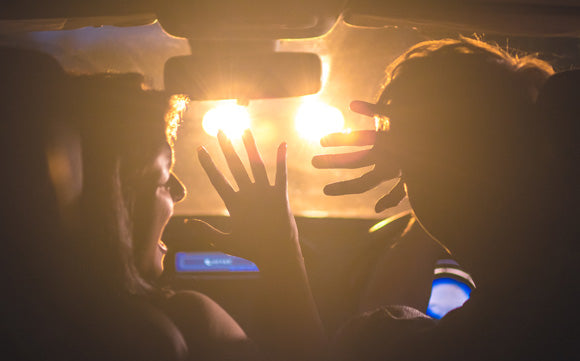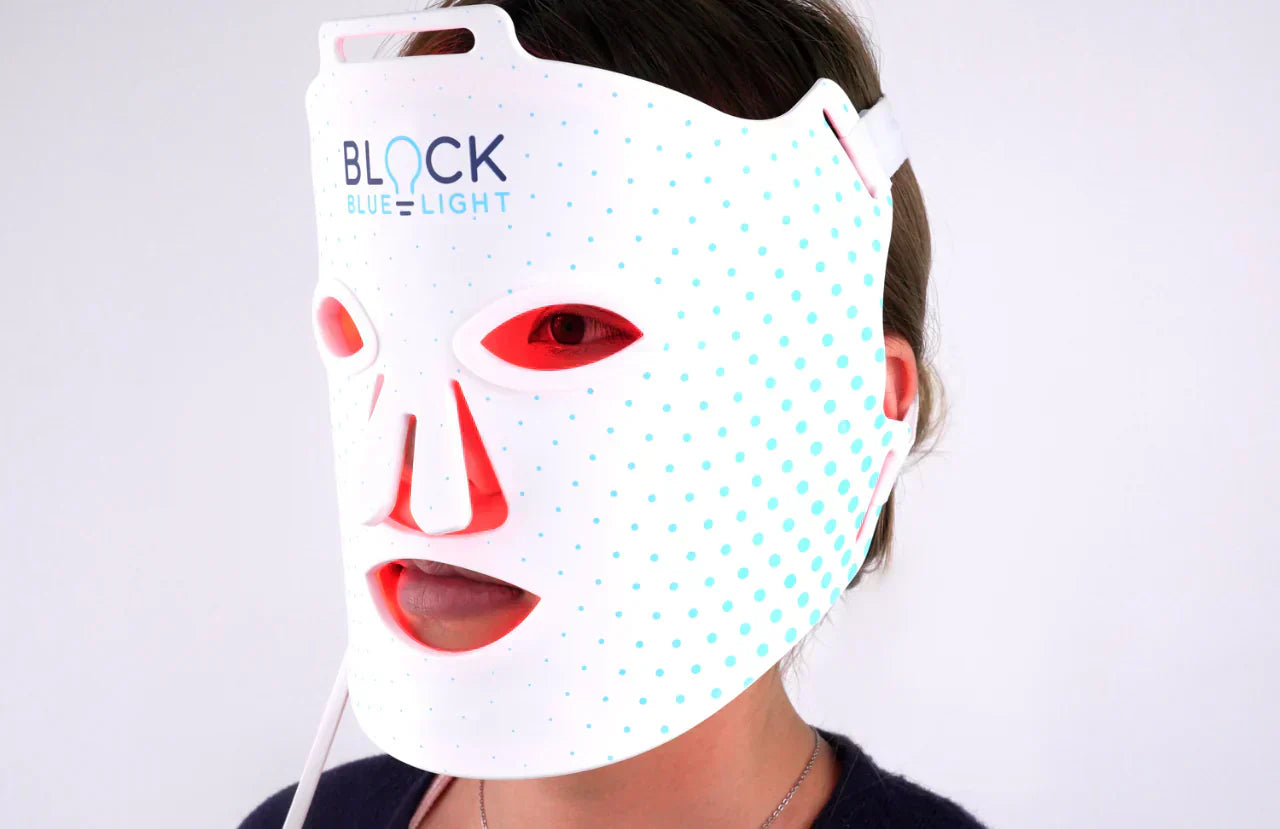Light sensitivity or photophobia is a condition in which bright light becomes uncomfortable and painful to your eyes. Photophobia literally means ‘fear of light.’ If you have eyes sensitive to light, you may have the following symptoms;
- Pain in and around the eyes
- Migraines and headaches
- Feeling the urge to squint, close your eyes or look away.
- Watery eyes
- Feeling dizzy in bright light
- Swelling
If you have light sensitivity, looking at sunlight, fluorescent light and incandescent light will cause discomfort and make you want to blink or close your eyes. Usually, you’ll experience these symptoms only if these sources of light are bright. However in extreme cases, even dull light can cause problems.
Photophobia is becoming a big concern in the modern world, due to the increased illumination of homes and public places, particularly after sunset. 5
Usually, photophobia or light sensitivity is a common sign of eye strain or digital eye strain. If your eyes are tired from intense use, such as from staring at screens for too long or from driving long distances, you may feel your eyes become sensitive to light. You’ll also experience other symptoms such as your eyes being sore, watery or blurred vision, headaches, sore neck and the need to squint.
Eye Strain or digital eye strain is a symptom of excess exposure to artificial blue light from screens and modern lighting. Using science backed blue light glasses can be used to reduce the damage caused by this artificial blue artificial light. To find more about digital eye strain, read our article “Digital Eye Strain from Screens and Artificial Lighting – and How to Avoid it in the Modern World”
However, it’s possible that your light sensitivity is being caused by an underlying medical condition.
Continue reading to find out what could be causing or worsening your light sensitivity and how you can deal with it.
Can blue light trigger light sensitivity?
Certain wavelengths carry higher energy than others. These lie in the 480-550 manometer range (blue-green light). This range of wavelengths is a cause for concern because it carries more energy per photon than any of the other colours in the spectrum of light. 4 These are the very wavelengths that are emitted by screens, LED lights and fluorescent lights. Thus if you have eyes sensitive to light, exposure to blue light or green light can be more painful for you because of the higher energy it carries.
In a study carried out last year to determine the brain circuit which is involved in blue light sensitivity, scientists discovered that blue light has a greater potential than yellow light to trigger sensitivity in the cornea after extended exposure. They also discovered that exposure to blue light can cause tearing and inflammation of the eyes.
Secondly, the cells in our eyes that are involved in light sensitivity are the ipRGC cells that are present at the back of our retina. These cells contain a pigment called melanopsin which is the main receptor of blue light. Thus the same cells which are involved in light sensitivity are those which are receptors of blue light.
In short, exposure to blue light is not itself the main cause for developing light sensitivity, but it can aggravate photophobia and cause longer to heal. 5
What causes light sensitivity?
Light sensitivity or photophobia has many causes- it is not a disease itself, but a symptom of an underlying medical problem. 1
When you have light sensitivity, the problem does not lie with your eyes, but in the nerve that connects your brain to the cells in your eyes that detect light. These cells (called ipRGCs) are different from the rod and cone cells that are responsible for vision. That is why even blind people can be affected by light sensitivity.
Medical conditions that cause light sensitivity can either be from birth, or you can develop them later on. Some people also experience light sensitivity without any eye condition. 2

Conditions from birth which cause light sensitivity
Permanent conditions which can cause light sensitivity, include ocular albinism (a condition in which the person does not have pigment inside the eye) and aniridia (a condition where the iris is missing from birth).3 If you have any of these conditions, the only solution to deal with light sensitivity, is to reduce your exposure to bright light and high-energy wavelengths (blue light).
You can do this by using head coverings and sunshades when you go out, and by using blue-light blocking glasses when working with screens.
Conditions you can develop which can cause light sensitivity
Since photophobia or your eyes being sensitive to light is linked with the nerve that links your eyes to your head, any damage to this nerve can result in developing light sensitivity. This could be from meningitis, brain injury, tumors in your pituitary gland etc.
Behaviors which can cause you to develop light sensitivity
Aside from medical conditions, light sensitivity can also be caused by your long-term behavior. Excessive exposure to strong light, such as looking directly at the sun (with or without sunglasses) can damage the eyes. Light sensitivity can also be triggered by excessive exposure to blue light (looking at screens for long stretches). It can even be caused by the opposite: remaining in darkened environments for days and wearing sunglasses indoors can make your eyes adapt to low light.

Treatment for light sensitivity
To treat light sensitivity, you will have to treat the underlying medical condition which is causing it. This could involve allowing the injury to heal, changing your medication (if that is the culprit) or altering damaging behaviours.
Blue light glasses for light sensitivity - do they work?
To fix your light sensitivity, you will have to treat the underlying medical condition which is causing it. If your light sensitivity is due to digital eye strain, then using blue light glasses combined with reducing your exposure to screens and fluorescent lights is the best solution. However, if you have a medical condition or an injury, then treating the underlying cause is the only way to solve the problem. Once the triggering problem is treated, your eyes will no longer be sensitive to light, in most cases. You can use blue light blocking glasses to reduce the strain on your eyes during the healing period, and make it less painful to use screens.
FAQs
Can I use blue light glasses for light sensitivity?
Blue light glasses are either clear (for daytime use) or red (for use after sundown). That a quite a few different companies selling blue light glasses, but make sure that they are legitimate before investing your money. The lens must target and filter out the entire spectrum of damaging wavelengths to be effective in reducing eye strain and light sensitivity. (400-550 nanometres). Some low-cost blue blocking glasses don’t filter the entire spectrum of wavelengths and are ineffective in reducing the damage to your eyes. To find out more about what to look for when purchasing blue light glasses for light sensitivity read our article “Not all Blue Light Blocking Glasses Are Created Equal, Which Blue Light Glasses Are The Best? ”
Are blue eyes more sensitive to light?
Yes, light sensitivity or photophobia is more likely to affect blue-eyed people because they have less pigmentation in the layers of their eyes to filter out harsh light. However, simply having blue eyes does not mean you will have light sensitivity.
Why am I sensitive to light without any reason?
Some people’s eyes are naturally sensitive to light. This usually affects people with blue eyes or those with ocular albinism. (People with no pigment in their irises). This is because their eyes have less pigmentation to filter out harsh light. The only solution is to avoid harsh light and artificial sources of light as much as you can. Wear wide-brimmed hats and sunglasses when outside and use blue-light blocking glasses when working with screens.
References:
Photophobia: Light Sensitivity and Migraines. (2019, May 15). Retrieved November 12, 2020, from https://www.webmd.com/eye-health/photophobia-facts
Person. (2020, November 11). Are your eyes sensitive to light? You may have photophobia. Retrieved November 12, 2020, from https://www.allaboutvision.com/conditions/lightsensitive.htm
Light sensitivity (photophobia). (2019, November 14). Retrieved November 12, 2020, from https://www.rnib.org.uk/eye-health/eye-conditions/light-sensitivity
David Ramsey, M. (2019, May 01). Will blue light from electronic devices increase my risk of macular degeneration and blindness? Retrieved November 12, 2020, from https://www.health.harvard.edu/blog/will-blue-light-from-electronic-devices-increase-my-risk-of-macular-degeneration-and-blindness-2019040816365
Marek, V., Reboussin, E., Dégardin-Chicaud, J., Charbonnier, A., Domínguez-López, A., Villette, T., . . . Parsadaniantz, S. M. (2019). Implication of Melanopsin and Trigeminal Neural Pathways in Blue Light Photosensitivity in vivo. Frontiers in Neuroscience, 13. doi:10.3389/fnins.2019.00497






